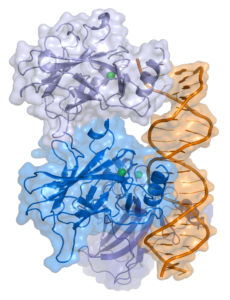
“Listen. Understand. The Terminator is out there. It can’t be reasoned with, it can’t be bargained with… it doesn’t feel pity or remorse or fear…and it will absolutely not stop. Ever. Until you are dead.” In the movie “The Terminator”, the Terminator’s one job was to kill a woman whose son will later hurt his cyborg people. You may wonder what the Terminator has to do with molecular biology but it’s actually quite relevant. We have a ‘terminator’ in our body called p53; its job is to kill rogue cells and prevent cancer from spreading through our bodies at all costs.
p53 works as a gatekeeper in the cells of our body. Just like how gates prevent criminals from getting out when they’re not supposed to, our cells have gates and security to prevent rogue cells, like cancerous cells, from squeezing past checkpoints that make sure cells are normal and healthy. Cells grow, mature and reach a point where they need to divide to make new cells. Each of these steps have checkpoints that make sure the cells are normal and healthy so that the new cells aren’t abnormal or cancerous. Without this security, cancer cells would be running rampant in our bodies. Many cancers are caused by a loss of security in the cell, allowing cancer cells to grow and divide without being stopped at these checkpoints. p53 is one of these gatekeepers. Its function is crucial for cell regulation, cell death and checking cells to make sure they’re not abnormal and cancerous.
When a cell grows and divides, it stops at certain checkpoints in that process to make sure nothing is abnormal and that it is a healthy cell. p53 acts at these checkpoints in the cell to inspect and ensure that the cell isn’t mutated or messed up in any way. If the cell passes inspection, then it moves along and keeps growing and then exits the cycle of growing and dividing. If p53 catches a rogue cell trying to sneak past a checkpoint with mutated DNA or too many chromosomes, it calls in a whole arsenal of molecules called caspases that kill the cell through a process called apoptosis or prevent the cell from making new cells.
Gatekeeper molecules are very important to the cell because they prevent mutated cells from growing and making more mutated cells, eventually leading to cancer or neurodegenetive disease. p53 is activated by cell stress, like external heat or toxins. Stress signals that there is something wrong with the cell division process and that there needs to be more stringent inspection of cells to determine the cause of cell stress and to get rid of it. The problem becomes when gatekeeper molecules themselves are mutated like how border guards can be corrupted or bribed. When p53 in a cell is corrupted, nothing else is checking the cell’s genome to see if it is mutated. These cells get a free pass to divide, thrive and build up in places they shouldn’t be, which is what causes cancer.

p53 is mutated in over 50% of cancers like ovarian cancer, breast cancer and colorectal cancer. When working properly, p53 is a tumor suppressor but when it is mutated, is becomes an oncoprotein, a protein that promotes cancer. Two copies of p53 or two gatekeepers are needed in each cell in order for p53 to inspect and shut down rogue cells properly. However, in cancer, one of these copies of p53 is mutated and the other copy is unable to keep up with all the inspections that need to be done. In aggressive cancers, the remaining copy of p53 can become mutated into an oncoprotein and help rogue cells grow, divide and spread to other parts of the body.
There are various ways that the body tries to prevent mutant p53 from enabling cancer to grow. One of these is through the protein Mdm2 which targets p53 for degradation. When the cell is happy and under low stress, p53 does not need to cause cell death. However, if p53 is mutated it will try to kill the cell. At this point, Mdm2 destroys p53 because it can see that p53 isn’t working properly. Mdm2 is responsive to p53. If p53 levels go up, Mdm2 levels go up as well so that the cell is working properly and is regulated. However, in cancer, Mdm2 can be shut down by other mechanisms so that it can’t shut down p53.
At UNC, Yanping Zhang’s lab studies the Mdm2-p53 pathway. In particular, they study what happens when Mdm2 is mutated and can’t degrade abnormal p53. Thus far, they have found that under conditions of low stress, Mdm2 can be mutated and not have any adverse effects on the cell. However, mice that do not have any Mdm2 were not viable because, left unregulated, p53 constantly killed the cells no matter if they were abnormal or not.
p53 is an amazing protein that works hard to terminate all the abnormal cells in our body. Hopefully, through more study, we can find ways to prevent the mis-regulation of p53 and thus help treat cancers due to p53 mutations.
Peer edited by Samual Honeycutt and Mimi Huang.
Follow us on social media and never miss an article: